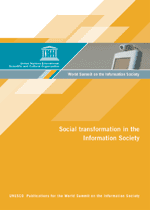
Download the entire report.
by William H. Dutton, UNESCO, 2004.
‘While technology shapes the future, it is people who shape technology, and decide to what uses it can and should be put’
Kofi Annan, United Nations Secretary-General
This publication argues for rethinking "access" in relation to ICTs beyond the traditional definition that referred primarily to physical access to ICT infrastructures, systems, and devices. It also widens the object of that access from information, as implied by the term ‘information society’, to include people, services, and technologies. The author seeks to place his presentation into a broad historical context by outlining the nature and limitations of current understandings of the information society. In this brief book, he seeks to "uncover and simplify the complex social, cultural, psychological, and economic processes underlying the social transformations in the real-world contexts in which people live, work, and make decisions about the design and use of ICTs." Summarizing the main competing perspectives that have contributed to current understandings of the societal implications of ICTs, the author goes on to discuss the main ways in which the design, production, dissemination, use, and consumption of ICTs can open and close personal, social, and organizational opportunities. He also discusses the main social factors that facilitate or restrict one's ability to make good choices about ICTs. Examples of activity in a number of different arenas are provided to show how ICTs could help to create different kinds of local, regional, national, and global futures. Finally, the author signals some key policy implications from his discussion.
The chapters in this book are:
1. Introduction: opening and closing access pathways to your future
2. The information society and social transformation
3. ICTs and society: the evolution of different perspectives
4. Social change tied to technological choices
5. Inventing our futures: the social factors shaping outcomes of digital innovation
6. Reconfiguring access in major economic, social, and political arenas
7. Summary: policy for a connected world
No comments:
Post a Comment